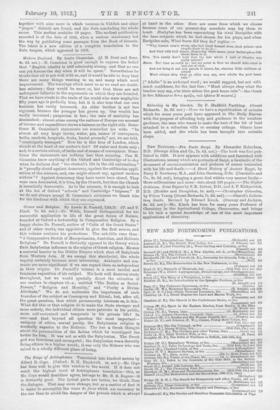The Frogs of Aristophanes. Translated into kindred metres by Alfred
D. Cope, (Oxford : B. H. Blackwell, 3s. not.)—Mr. Cope has done well to give this version to tho world. If it does not reach the highest level of Aristophanio translation—this, as Mr. Cope would doubtless agree, belongs to Mr. 13. B. Rogers—it Is distinctly good. The lyrical parts are better, we think, than the dialogue. That may seem strange, but as a matter of fact it is easier to accomplish the tours de force which are necessary in the one than to avoid the danger of the prosaic which is always
at hand in the other. Here are some lines which we choose because some of our present-day novelists may lay them to heart. 2Eschylus has boon reproaching his rival Euripides with the base subjects which he had chosen for his plays, and when Euripides asks, What harm did they do ? replies
"Why, honest men's 'riven, who had lived honest lives, took poison—you intight them to do it,— And died with foul shamo, disgrncing their name, your neneropiem-fola drove them to it.
Eon, You surely don't hold that the tale which I told of Phaedra was really untrue? Aeon. No I true as could be ; but my point is that we should hide what is bad out of view, And not bring it out, and parade it about, for, whereas little children at school
Mast always obey what nu elder may say, over adults the poet bears rule," [" Adults" is an awkward word ; we would suggest, but not wills much confidence, for the last line "Must always obey what the teacher may say, o'er their elders the poet boars rule "—the Greek is rdll 5aidOltaA.05 (.1CPTLY cppaCet, ToZs ii:16.1cra N lemma.)










































 Previous page
Previous page